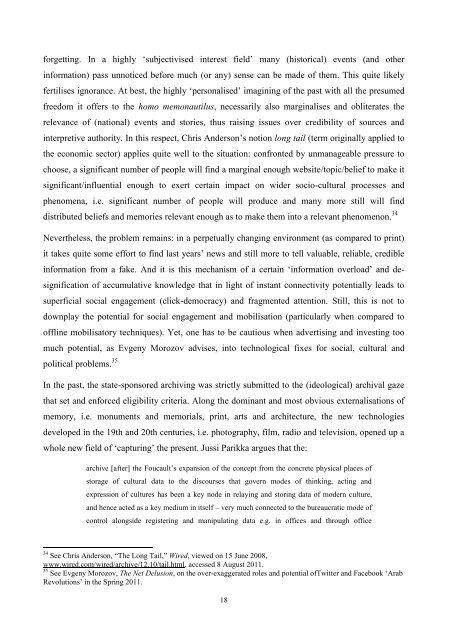UNIVERSITY OF NOVA GORICA GRADUATE SCHOOL ...
UNIVERSITY OF NOVA GORICA GRADUATE SCHOOL ...
UNIVERSITY OF NOVA GORICA GRADUATE SCHOOL ...
Create successful ePaper yourself
Turn your PDF publications into a flip-book with our unique Google optimized e-Paper software.
forgetting. In a highly ‗subjectivised interest field‘ many (historical) events (and other<br />
information) pass unnoticed before much (or any) sense can be made of them. This quite likely<br />
fertilises ignorance. At best, the highly ‗personalised‘ imagining of the past with all the presumed<br />
freedom it offers to the homo memonautilus, necessarily also marginalises and obliterates the<br />
relevance of (national) events and stories, thus raising issues over credibility of sources and<br />
interpretive authority. In this respect, Chris Anderson‘s notion long tail (term originally applied to<br />
the economic sector) applies quite well to the situation: confronted by unmanageable pressure to<br />
choose, a significant number of people will find a marginal enough website/topic/belief to make it<br />
significant/influential enough to exert certain impact on wider socio-cultural processes and<br />
phenomena, i.e. significant number of people will produce and many more still will find<br />
distributed beliefs and memories relevant enough as to make them into a relevant phenomenon. 34<br />
Nevertheless, the problem remains: in a perpetually changing environment (as compared to print)<br />
it takes quite some effort to find last years‘ news and still more to tell valuable, reliable, credible<br />
information from a fake. And it is this mechanism of a certain ‗information overload‘ and designification<br />
of accumulative knowledge that in light of instant connectivity potentially leads to<br />
superficial social engagement (click-democracy) and fragmented attention. Still, this is not to<br />
downplay the potential for social engagement and mobilisation (particularly when compared to<br />
offline mobilisatory techniques). Yet, one has to be cautious when advertising and investing too<br />
much potential, as Evgeny Morozov advises, into technological fixes for social, cultural and<br />
political problems. 35<br />
In the past, the state-sponsored archiving was strictly submitted to the (ideological) archival gaze<br />
that set and enforced eligibility criteria. Along the dominant and most obvious externalisations of<br />
memory, i.e. monuments and memorials, print, arts and architecture, the new technologies<br />
developed in the 19th and 20th centuries, i.e. photography, film, radio and television, opened up a<br />
whole new field of ‗capturing‘ the present. Jussi Parikka argues that the:<br />
archive [after] the Foucault‘s expansion of the concept from the concrete physical places of<br />
storage of cultural data to the discourses that govern modes of thinking, acting and<br />
expression of cultures has been a key node in relaying and storing data of modern culture,<br />
and hence acted as a key medium in itself – very much connected to the bureaucratic mode of<br />
control alongside registering and manipulating data e.g. in offices and through office<br />
34 See Chris Anderson, ―The Long Tail,‖ Wired, viewed on 15 June 2008,<br />
www.wired.com/wired/archive/12.10/tail.html, accessed 8 August 2011.<br />
35 See Evgeny Morozov, The Net Delusion, on the over-exaggerated roles and potential ofTwitter and Facebook ‗Arab<br />
Revolutions‘ in the Spring 2011.<br />
18

















